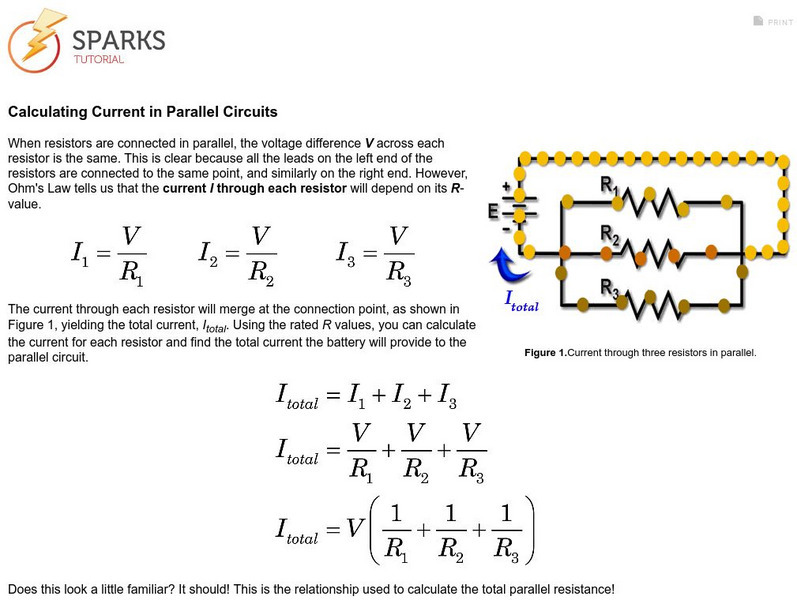Hi, what do you want to do?
Boston University
Elementary Physics: Current and Resistance
A general summary of electrical resistance including a comparison of AC and DC current.
Physics Aviary
Physics Aviary: Series Circuit Lab
This lab is designed to have students investigate the relationships between voltage, resistance and current in a series circuit with up to three passive components. The batteries in this simulation can be varied from ideal batteries to...
Science and Mathematics Initiative for Learning Enhancement (SMILE)
Smile: Electric Currents and Circuits
This cooperative learning activity for intermediate to junior high students has them create various electrical circuits in order to understand electricity.
Science and Mathematics Initiative for Learning Enhancement (SMILE)
Smile: Resistances in Series and Parallel Circuits
A teacher lesson plan is provided here. This page describes two activities in which the effect of multiple resistors on the current and overall resistance of both series and parallel circuits are investigated. Complete activity...
Science and Mathematics Initiative for Learning Enhancement (SMILE)
Smile: Simple Circuitry and Series Circuit
A teacher lesson plan which could be easily converted into an idea for a student project or presentation. This page describes an activity in which the basic nature of a circuit and the concepts of a series circuit are investigated....
TeachEngineering
Teach Engineering: Circuits and Magnetic Fields
In this activity, students use the same method as in the activity from lesson 2 to explore the magnetism due to electric current instead of a permanent magnet. Students use a compass and circuit to trace the magnetic field lines induced...
CK-12 Foundation
Ck 12: Physics Simulation: Flashlight
[Free Registration/Login Required] Learn about electric circuits, the flow of current, electrical resistance, and electrical power dissipation by exploring the operation of a flashlight using this interactive simulation. A PDF worksheet...
Concord Consortium
Concord Consortium: How Do Breadboards Work?
See how a breadboard electrical circuit works.
National High Magnetic Field Laboratory
Magnet Academy: Wheatstone Bridge 1843
Read about the device used for measuring resistance in a circuit which was discovered in 1843, but had been invented a decade earlier. The inventor's name was not Wheatstone.
Science Buddies
Science Buddies: Sliding Light: How to Make a Dimmer Switch With a Pencil
In this electronics science fair project, students will make a simple dimmer switch and investigate the relationship between the resistance in the circuit and the amount of light produced. The Science Buddies project ideas are set up...
Khan Academy
Khan Academy: Dc Circuit and Electrical Power Review
Review the components of a circuit and their symbols such as battery, resistor, and switch. Analyze how the power of a resistor is related to the current and electric potential difference across the resistor.
Concord Consortium
Concord Consortium: Dc Circuits: Series Parallel Resistances (Sparks 3)
Answer questions regarding voltage drops across resistors and currents through them in such circuits. Practice calculating the effective resistances of a set of resistances in series and parallel.
Concord Consortium
Concord Consortium: Dc Circuits: Series Resistances (Sparks 1)
This interactive simulation guides you through the wiring of the standard breadboard and presents you with questions regarding voltage drops and currents in series resistive circuits.
Concord Consortium
Concord Consortium: Troubleshooting Dc Circuits (Sparks 4)
Discover a sequence of all-resistor DC circuits in which one of the resistors is either open or short-circuited.
Khan Academy
Khan Academy: Electric Potential Difference and Ohm's Law Review
Review the key terms, equations, and skills related to Ohm's law, including how electric potential difference, current, and resistance are related.
Science Buddies
Science Buddies: Which Materials Are the Best Conductors?
There are two main types of materials when it comes to electricity, conductors, and insulators. What are they made of? Find out by testing different materials in a circuit to see which ones conduct the most electricity.
Science Buddies
Science Buddies: Project Ideas: Which Materials Are the Best Conductors?
A simple science fair project to test whether electricity can flow between two things. The Science Buddies project ideas are set up consistently beginning with an abstract, objective, and introduction, followed by a section on terms,...
TeachEngineering
Teach Engineering: The Path of Electrons
Students engage in an interactive "hot potato" demonstration to gain an appreciation for the flow of electrons through a circuit. Students role play the different parts of a simple circuit and send small items representing electrons...
Physics Aviary
Physics Aviary: Rc in Ac Lab
This lab was designed to help students understand the difference between circuits powered by DC and circuits powered by AC. Students can see that simple changes in frequency lead to changes in the potential difference across the...
CK-12 Foundation
Ck 12: Physics Simulation: Dollhouse
[Free Registration/Login Required] Learn about the analysis of parallel circuits in the context of a realistic household circuit using our interactive simulation. A PDF worksheet and a video tutorial are also available. [3:24]
Physics Aviary
Physics Aviary: Induced Current Lab
This lab was designed to have students test the factors that determine how much current is induced in a circuit when area of the circuit is changed. This lab is a quantitive lab that supplements the lab on magnetic flux.
Concord Consortium
Concord Consortium: Measuring Current in Parallel Circuits
When measuring the current in parallel circuits, compare the circuit's total current with the current through just one resistor.
CK-12 Foundation
Ck 12: Electric Current
[Free Registration/Login may be required to access all resource tools.] The definition of electric current is explained and how to calculate an electric current. Includes links to resources for learning more about electricity, i.e., a...
Concord Consortium
Concord Consortium: Calculating Current in Parallel Circuits
Use Ohm's Law to calculate the current in parallel circuits.























